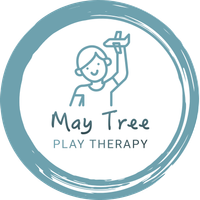May Tree Play Therapy
Through play therapy, children learn to communicate with others, express feelings, modify behavior, develop problem-solving skills, and learn a variety of ways of relating to others. Play provides a safe psychological distance from their problems and allows expression of thoughts and feelings appropriate to their development.
What is play therapy?
Play therapy is a therapeutic approach for children (age 4 to 12) facing emotional, behavioural, or social difficulties. Play therapy requires the therapist to come to the child’s level and communicate with them using their language – play.
Talking about problems can be hard for children. A child may not have the words to describe how they are feeling or why they are behaving as they are. Play is a child's natural way to express themselves and make sense of the world around them.
Who can benefit from play therapy?
Play therapy can help children who are facing challenges in their lives, including:
- Managing difficult feelings like anger, sadness or rejection
- Anxiety or worry
- Low self-esteem
- Family issues or breakdown
- Parental separation
- Loss / bereavement
- Medical issues
- Friendships and peer relationships
- Bullying
- Neurodevelopmental differences including ASD and ADHD
- Acute trauma from a frightening or distressing event or experience
- Developmental trauma (abuse, neglect or repeated frightening or distressing experiences that have a negative effect on development)
Is play therapy evidence-based?
Yes, research has shown play therapy to be an effective mental health intervention for children experiencing a wide variety of social, emotional, behavioural and learning problems (Bratton et al, 2005).
All registrants of play therapy Ireland (PTirl) are required to record the clinical outcomes of their work with children as observed by parents and referrers. The psychometric instrument used is the Goodman’s Strength and Difficulties Questionnaire (SDQ).
SDQ results in Ireland based on the children that have received play therapy delivered to the PTirl/PTUK standards for an average of 16 sessions show the following:
- 77% of children show a positive change as observed by parents.
- 75% of children show a positive change as observed by referrers.
For more in depth information about how play therapy works visit https://playtherapy.org.uk


